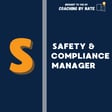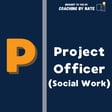Become a Creator today!Start creating today - Share your story with the world!
Start for free
00:00:00
00:00:01

Electrician: Jamie's Journey from Electrician to Firefighter and Bouncy Castle Business Owner"
Tune in to our latest podcast episode featuring Jamie Morris, the Tunnels and Technology Manager for ITS within the Welsh Government's highway network. But wait, there's more! Jamie's career journey is anything but conventional. From wielding his skills as an electrician to juggling roles as an on-call firefighter and running a bouncy castle business. Join us as we delve into his story, uncovering the unexpected twists and turns that have shaped his diverse career path. Don't miss out on this conversation filled with insights and inspiration!
Transcript
Podcast Introduction
00:00:05
Speaker
Welcome to A to Z Jobs, the podcast that delves into the fascinating world of careers, one profession at a time. In each episode, we'll deep dive into a specific profession, exploring its history, requirements, challenges, and rewards. So get ready to expand your horizons, challenge your perceptions, and discover a world of possibilities. I'm Roxy. And I'm Nate. And we're excited to host you on this journey.
Meet Jamie Morris
00:00:29
Speaker
In today's podcast, we have a fascinating guest joining us, Jamie Morris. Jamie is the tunnels and technology manager for ITS, working within the Welsh government's highway network. But that's just his current role in a diverse career journey. Not only is Jamie an electrician by trade, he also wears many other hats. He's not just managing tunnels and technology, he's also an on-call firefighter and runs a bouncy castle business.
00:00:54
Speaker
So stay tuned as we dive into his career journey, exploring everything from electrician work to bouncy castle businesses and beyond. Hi Jamie, welcome to our podcast. Thanks for having me today. Brilliant to have you. We have three different time zones today, which I have to mention. We're calling to the UK from Australia and Hong Kong at the same time. So it's pretty exciting. But let's dive straight in and ask you the first question. What do you do for a living?
Managing Welsh Infrastructure
00:01:22
Speaker
So I work for the Trunk Grid Agency and my job title is ITS Tunnels and Technology Manager. So I work for basically one of the local authorities for Welsh Government that manage the highway network.
00:01:41
Speaker
In layman's terms, my job is basically looking after anything that's got electric on it on the highway. So traffic signals, street lights, cameras, anything you can imagine.
00:01:54
Speaker
amazing and you don't just do that right you've also got no so um i'm also an on-call firefighter for mid and west wales fire rescue service um so i'm a retained firefighter i can carry pager pager goes off um yeah so that's basically my part-time job um then i'm also um a partner with my wife
Launching a Bouncy Castle Business
00:02:20
Speaker
in a business looking after, well, bounty castles, inflatables, rodeo bulls. So yeah, we run a business over here as well doing that. So yeah, three jobs.
00:02:36
Speaker
keeps us out of trouble. So many questions, I don't even know where to start. I want to talk about the firefighting, but then you talk about bouncing castles. I want to know more about that too. How do you fit this all in? How does this all work? So I've sort of built it up over the last, I'd say, sort of seven to 10 years, where my sort of career from my day job, I've gone from the local authority, I've gone from on the tools electrician.
00:03:04
Speaker
That's where I started off. I'd done my apprenticeship and then went on to management and started building sort of little bolt-on bits of work there. With that, then I've
00:03:18
Speaker
gone to, sorry, there is a humongous spider crawling up the wall in front of me. We're gonna have to add it to the show notes. I'll check it with the giant lizard that's living under my bed right now. Hopefully you'll scarper off in a minute.
00:03:45
Speaker
obviously built my career up with my day job.
Balancing Firefighting and Business
00:03:49
Speaker
I then decided that I was going to delve into the firefighting. I started off then, done my training and making it work really because I've been very fortunate that
00:04:02
Speaker
Throughout my day job, I get released from work for the firefighting. Because it's an on-call role, a lot of the local authorities do release employees for firecalls and stuff. We're quite a busy station here, so we get around about 350 calls a year thereabouts, so averaging one a day. I might go a week without any, and then we might have
00:04:32
Speaker
four or five in a day some days. But yeah, so we're very lucky that we get released from work for the firefighting. And then after COVID, we had this great idea to start doing inflatables. We've got two young children. We've got Phoebe's five and Harry, who's three, come to their birthday and couldn't get an inflatable. So we bought one and got insurance and sort of spiraled from there somehow and then
00:05:02
Speaker
We had a local company to us who'd done 20 years in the business. He decided that he was selling up and didn't want to do inflatable anymore. So we decided to start buying things off him quietly. And I've no idea why, I just decided to end up buying most of it.
00:05:19
Speaker
I ended up with rodeo balls and all sorts of wacky and wonderful things. Two years ago, I was at your house and you were like, you have to come see this, Rox. It's a thriving business and I'm constantly liking being a photographer when I get back to the UK.
00:05:41
Speaker
And that, to be honest, that business, that's my sort of first real business that we've put effort into. We've got websites set up properly with SEO and with the inflatables and the work. So we do a lot of work for a lot of companies and a lot of corporate work, as well as the sort of domestic work for people's bouncy castles in their houses and stuff. And that sort of just spiraled, really.
00:06:11
Speaker
We've got
Event Logistics and Expansion
00:06:12
Speaker
three, four lads working for us now that'll help us out on the weekends and stuff. And then through the summer, so pretty much how to say from May to September, they're our core busy months. We do a lot of the carnival, we do most of the carnivals and shows around here now. So we do a lot of event work now, again, which in a million years, I wouldn't have thought.
00:06:40
Speaker
the day job and sort of my experience with the electrician stuff has kind of been the sort of base really from the bouncy gas stuff because we have to use a lot of generators a lot of cabling there's a lot a lot of relevance between both businesses even though you wouldn't think an electrician and bouncy gases and it's quite quite common quite a common theme and
00:06:59
Speaker
Transferable skills is something we bang on about. You have no idea what your transferable skills might apply to until you give it a go.
00:07:12
Speaker
Um, same transferable skills, even down to the firefighting, obviously we're all on call firefighters. So, um, we've got people from different walks of life. We've got, uh, builders, we've got electricians, plumbers, mechanics. Um, and, and to me, that's more valuable than a lot of sort of, you know, whole time, full time firefighters, because when you get a fire engine full of retained firefighters, you've got that huge variety of skill compared to somebody who's just been trained as a fireman.
00:07:42
Speaker
you know, it's a completely different level there. Yeah. And as a mum renting like a bouncy castle or a few and thinking about everything bad to do with the bouncy castle, I'd rather rent it off you because I think you'd know what to do if it popped. And that's something where, you know, it's been a lot, it's been a very big learning
Industry Regulations and Customization
00:08:06
Speaker
curve.
00:08:07
Speaker
Um, inflatables, there's still a lot of regulations behind it and a lot of other things that, you know, when we started doing that, we've just picked up as we've gone along. But I think we've, you know, we've got there must be enough of it seems to turn enough over. It's incredible. Cause you got working with children, you've got insurance and like, and a lot of like probably five or six years.
00:08:30
Speaker
that you would have gone through that a lot of people, including me, would have gone too much for me. But knowing you, and for the amount of years I have, I know you've just gone for it. And it's amazing. One thing that Sarah says as a downside to me is I don't say no. I can write ideas, and I'm like a million miles ahead then. If it's something that comes into my mind, I think, yeah, that could work. I'm doing it. It doesn't matter.
00:08:58
Speaker
Can you can give us like a ballpark figure like you decided that you know you're having a party you can't get a bouncy car so you buy one how much does that cost and then actually there's like a different standard for when you're renting them out to people compared to just using them at home or is it one standard?
00:09:16
Speaker
Yeah, so it does vary. We purchased a lot of our inflatables brand new now. So the lead time is around about four to six months to have one made here now. So you have to sort of plan a lot in advance for swapping equipment over. But anywhere between sort of two and a half to 5000 pounds, British pounds, and then
00:09:41
Speaker
We're renting them at around about £100 a day. So we tend to do day hires. So whether you have it delivered at dinnertime till teatime, it makes no difference whether it's first thing in the morning or dinnertime. Like that inflatables if allocated for the day.
00:09:57
Speaker
Obviously events, there's a lot more turnover and a lot more money to be made in events, but there's a lot more risk and a lot more work that goes behind the scenes of it. I've got a lot of equipment sought out and fixing and maintaining. So we have companies that maintain them for us, and then we do little bits as well ourselves. So obviously keeping costs down and simple jobs, I'm pretty hands-on. So go and get the needle and thread out if I have to stitch a bouncy castle back together.
00:10:26
Speaker
Can I just, as a bit of a promotion for yourself, can you, do you have themes for your castles or are they? Yeah, so we have a lot, I'm sorry, we've got our website midwellsboundtigassles.co.uk, no plug-in.
00:10:45
Speaker
We've got obviously different types of inflatables. So not only have we got bouncy castles, we've got different types of inflatables. We've got big games and other things as well. A lot of the inflatables we tend to go for are Velcro themed. So the themes are printed on like a Velcro panel that we stick on and then we can swap them over. So what we might have is it might show that we've got, say, 15
00:11:09
Speaker
bounty castle look very similar but we've actually got is three of those bounty castles and then we've got 15 velcro themes
00:11:19
Speaker
instead of having 15 physical bouncy castles and then having to go and get say the princess one or the the pirates one or this that or the other what we can do is we can have one bouncy castle and then you can just change the themes over so if somebody wants a bouncy castle for say a twin boy girl birthday party and they want it as a pirate and then they want it as princess in the afternoon or whatever they can just put them on yeah physically swapping bouncy castles over I went to a carnival
00:11:48
Speaker
a week ago and they had the poor patrol but it was like Japanese poor patrol or something like that it was so weird it was like oh the middle of rural New South Wales Australia we've got careful with inflatables over here because because the regulations are so stringent because there's been so many accidents and stuff over the years and with insurance we've got PIPA testing and RP2 testing
00:12:19
Speaker
And the other big problem that we've got is copyright laws. So we've got to be very, very careful over here what themes you go for. So you've got to be very cunning.
00:12:30
Speaker
in how teams are presented on websites with SEO and certain companies can soon find and you get cease and desist letters just because you've got a poor patrol bouncy castle. We've been very lucky so far.
00:12:52
Speaker
We're very careful on what themes we go for, but I know of a lot of companies that have got themselves in hot water, so to speak. Yeah, yeah. No, I can imagine. And it's so easy now because everything gets picked up just like that. You can't even upload anything onto YouTube that has anything. No, you've got to be so careful.
Diverse Roles of a Firefighter
00:13:09
Speaker
The algorithms, they're watching us.
00:13:11
Speaker
But the idea is the scammers are getting you too, just a little bit, but like Facebook have all these stupid scams that they're pretending to be Facebook to be like, you're copywriting, click on this link to fix it. And it's like, eh. Yeah. So your actual day job, what do you do in that? So, um, I.
00:13:36
Speaker
Fundamentally, I'm an electrician, but I'm an electrician at a desk now. I manage basically all the electrical infrastructure for the Welsh government on the road network for North and Mid Wales. We look after all sorts of different equipment from traffic signals, traffic lights, to ANPR cameras for the police forces.
00:14:05
Speaker
yeah all sorts of wonderful things traffic loop counters in the road so that they detect things like the speed and the class of vehicle for information gathering um yeah and then as part of my job as well i'm also basically a site manager for the Conway tunnels up in North Wales um so we've got six well we've got four tunnels classes tunnels and then headland um
00:14:33
Speaker
that when we do maintenance closures like last week I was up there for a maintenance closure so they're carrying out different different inspections and testing and then project works in the tunnels so we do night night works all that tends to be done at night obviously with traffic volumes and stuff so yeah I'm overall site manager then for the works going on there and principal contractor so
00:14:55
Speaker
Yeah, we basically look after anywhere between sort of 50 to 100 people on site then at night doing all sorts of things down in the tunnels. So we've got a couple of tunnels that go under the estuary in Conway, and then we've got Penn Mine Bath, and we've got Pennaclip and the Headlands. So yeah, we've got a couple of different tunnels, some that go through rocks and some that go underwater.
00:15:22
Speaker
that's the most interesting part I love doing that sort of stuff obviously being down here in Mid Wales I travel up to North Wales which is what a couple of hours drive but yeah I'm very very lucky because it's quite a unique job there's not obviously there's not many of us in the country that do this sort of work
00:15:44
Speaker
Can I go out on a limb and say there's not an average day for you then? No. And the next question is through a day-to-day routine, but do your best to try and fit that into what might look like an average day for us? So average day, obviously I look after the day-to-day faults, so I go through each different type of asset that I'm responsible for.
00:16:07
Speaker
I'll go through making sure there's no faults or new faults that have appeared on there. Things like the weather stations for the Met Office. I look after all of them, so I'll go through them on the server, check there's no faults, nothing disconnected from the network or getting any spurious readings. Once I've done that, if there's any faults, I'll pass them over to our maintenance contractors and send them over the orders.
00:16:32
Speaker
And then it's basically just admin. So we've got a lot of project works that go on. So I look after various different projects from traffic signals.
00:16:41
Speaker
cameras and stuff so if we're changing say a traffic signal site I've got a couple of projects on at the moment where we're upgrading traffic signals I'll be speaking to the maintenance contractors speaking to the project coordinators from the different traffic signal companies that we that we sort of work with getting quotes raising orders yeah there'd be nothing sort of me raising an order for
00:17:09
Speaker
anywhere between 20 to 50,000 a day for different project works that go on. That's a daily occurrence. I've got lots of projects that go on. I do a lot of new technology as well, so new technology sort of investigation. So we'll say we've got a project manager or we've got
00:17:33
Speaker
I don't know, a colleague that's come up with an idea or has found a new bit of equipment that might be useful for us or we think may be useful for a certain situation, then they'll pass it over to me. I'll have a play with it. I'll purchase some of the equipment or start looking into it. And then, yeah, start setting things up and getting costs together and then put what we call a PID project initiation document together. So I'll go off, enter,
00:18:00
Speaker
Mr. Walsh government and say, here I is all the kit is the price. Do you want it or not? That's a lot. It's a lot of juggling and, you know, having different days. It's nice to have little projects as well. Like the different aspects that you can try and learning new technologies. That's always so daunting for me. I think it's just like day is different. That's that is a, you know, a real thing with, with this sort of job. Um,
00:18:30
Speaker
I've been very fortunate to get where I am now. It's quite a unique role really for the sort of background that I've come from my day job as an electrician.
00:18:44
Speaker
It's still relevant, but it's still learning a lot as well. I was going to just dive in and ask about the firefighting then. So how often do you get pulled out for that? Is that sort of half days or four days? And how does that impact the project work that you're doing? I'm very lucky with my employer. They're very thoughtful and kind when I go running off after a meeting or halfway through a meeting and my alerter goes off.
00:19:11
Speaker
So I've got my own little agreement in place with my employer so I've got a little agreement written up that we both signed when I started and moved over from the local authority just to sort of make it fair and they can understand what I'm expected and vice versa sort of thing so that it's all above board.
00:19:34
Speaker
I'll get, if I get a call in a day, could be a couple of hours, could be a full day, could be a couple of days. With the fire service here, we've got two fire engines and we've got a water bowser.
00:19:47
Speaker
So our water bowser is a part of like a countrywide resilience. So kind of like the big HVPs and the big high volume pumps that they've got, they can be called sort of anywhere. So it might not be a local call. It could be three hours away if they need the equipment that far away and you could be gone for a day or two. You know, it's known to have happened. But yeah, day job.
00:20:17
Speaker
works well with the fire service and vice versa. With the fire service, they understand that it's not our full-time job. So if we can get relieved at an incident, so if we're at what they call a protracted incident where we know it's going to be a long time, say a scrapyard fire, you're going to be there for three or four days. They'll rotate crews every four, five, six hours to allow us to get back to our day job.
00:20:46
Speaker
and they'll call cruising then from further away to relieve us. Yeah. It's not just fires, right? You get called out for all sorts of...
00:20:56
Speaker
Yeah, everything wacky and wonderful. I've had some very entertaining calls. I've had some obviously very horrible calls over the years. Obviously the entertaining ones are more fun. Getting called at one o'clock in the morning on a Friday morning to a man and a woman handcuffed together outside the post office. They'd be closed, but I've no idea why. They'd lost the key.
00:21:27
Speaker
Are you feeling inspired by everything you've learned so far? Keep that momentum going with our four-part Career Change Made Easy course.
Career Change and Learning Opportunities
00:21:33
Speaker
Dive deeper at thecareerchangecoaches.com. Now enjoy the rest of the podcast. Oh, gone for a walk, didn't want to lose you. That one was very hard to explain. I think it would be me being stuck in an elevator or something.
00:21:55
Speaker
Predominantly, our calls up here are road traffic accidents. So we get car accidents, motorbike accidents. And because we're so rural, I'd say not quite as rural as a lot of people in Australia, but we're still quite rural. And we get a lot of resilience and support for the ambulance service. So we'll go to cardiac arrests.
00:22:18
Speaker
so we might be first on scene to a cardiac arrest an hour or two hours before an ambulance even gets here so which again is quite quite a common common thing. You've got an ambulance like volunteer background for that as well haven't you? Yeah so I think it was just under 10 years with St John Ambulance um again when I was an apprentice I decided I wanted a
00:22:43
Speaker
do a little bit different as well, you know, do something a little bit different. And I started off as a volunteer with St. John Ambulance. So I'd done all my training. And then after a few years, I, I managed to get up to so they've got like first aid levels, and then they've got like patient transport. And then they have emergency transport attendant level.
00:23:04
Speaker
I got to emergency transport attendant level and which allowed me then to give certain drugs and obviously, you know, do certain procedures and, you know, understand a lot more about sort of medical stuff again, which has sort of helped me hugely with the fire service stuff. You know, it can be a pain sometimes because we'll be off to an RTC and then person in charge in the front will say, Jamie's in the back, right, your medical care.
00:23:32
Speaker
I don't want to be looking after everybody all the time. I want to cut the car up. You know, it's quite nice because, you know, the guys will look back sometimes and they're relying on you. Sometimes it can be quite stressful because of that as well. You know, in a stressful situation, they're there sort of looking at you and it's like, yeah, pressure's on. Scary situation as well. You know, it's other people's lives. Yeah.
00:24:00
Speaker
I wouldn't say I've got a sort of, I don't know what the word would be, complacent with it, but, you know, because of my ambulance sort of experience from quite a young age, I was 18, just over 18 when I started doing that sort of stuff.
00:24:19
Speaker
Obviously, I saw quite a lot there. I had accommodations for, you know, different things with the ambulance service with cardiac arrest and, you know, people survive in and stuff because of like what we've managed to do. But, you know, I feel that because I understand what's going on a little bit more, maybe, and
00:24:41
Speaker
that knowledge from the ambulance then it doesn't seem to I wouldn't say affect me much but I don't feel sometimes distressed doing it and people are like well you know to do that well just do it because you started in that as like a volunteer were you a volunteer the whole time
00:25:05
Speaker
No, so, well, yes, technically, yes, I was a volunteer, but I was still there during the start of Covid and I think I did two, yeah, about 18 months through Covid. And then then obviously we started the bounty castles and I had to give some, you know, I had something I had to give, so to speak.
00:25:25
Speaker
But we did do paid work for the ambulance service as well, so one of the bonuses once you got to what they call PTA, patient transport level, we could do different shifts for the ambulance service.
00:25:41
Speaker
So we would be doing what they call UCS chef, so urgent care chef. So I'd finished work at four or five o'clock in the afternoon from sparking. I'd go and get changed into my ambulance uniform, and then I'd go and do an evening shift on the ambulance until maybe 10, 11, 12 o'clock at night, depending on how busy they were. And that was paid. Although it wasn't great, I think it was, you know, £10 an hour or whatever they paid at the time. But
00:26:08
Speaker
it was the experience more than anything more than the money yeah the money was nice they'd be wrong but it was the experience obviously you got to see patients and dealing with patient care and like dealing with different sort of you know medical conditions and stuff so um yeah it's quite good yeah i've always admired it i don't think i could have done it so i was always like like go Jamie
00:26:33
Speaker
to round off the day-to-day question. So we talked about the electrician work, then the firefighters. How do you fit in the bouncy castle? Is your wife doing a lot of that or are you doing that in the evenings? Is that the admin? You mentioned you've got a team doing the actual events for you, but how do you fit it in? Very difficult. So when we started the business,
00:26:56
Speaker
I predominantly did a lot of the admin and the day-to-day management of the, I'd say, jobs coming in, the bookings. So I was taking them on the phone and putting them on the booking system. We've got a booking system on the website as well, so people will autonomously book. They'll fill all the details in, make payment over the website. So it was just managing that and
00:27:21
Speaker
you know, sort of the coordination then of the bookings, but over the last, I would say six to eight months,
00:27:29
Speaker
I've got very, very busy with work, so the wife has taken a lot more of that on. Obviously, our children have grown up a little bit more now, so it's a little bit easier. They're in school a little bit more. My little boy goes to nursery now, so she's got a little bit more time now to sort of manage the bookings. Yeah, most of the bookings are obviously weekends.
00:27:52
Speaker
But we do have bookings in the week and the wife only works a couple of days a week at a local nursery So she manages sort of bookings around that as well. So she's off for the day. She'll take a book in She knows in advance what days she's working and stuff. And So we're very very lucky like that. It's a very flexible business as well. So we make We try to make the business work for us not the other way around now and when we first started we were
00:28:19
Speaker
very enthusiastic because everybody is when they start a business you know it's a wow you know everybody wants to give me money and you know i want to take bookings and you know it's just a million miles an hour and but we soon realized that um you know if we kept on that theme we you know we wouldn't sustain it very long you know you just physically couldn't keep up with everything
00:28:41
Speaker
So yeah, we make the business work for us now. We've got a couple of lads in that do a majority of our work on the weekend for us. You know, I still do a lot of the driving and the wife obviously takes the lads out as well doing bookings. We've just got a second van. So we're still building the business, but we've sort of rained it back quite a lot from when we first started.
00:29:08
Speaker
mainly because we didn't want to take that step to it being a full-time career or job or business because I was very daunted in having to employ people full-time or employ people part-time to physically run the business for us. There's quite a lot of risk with the business like this. There's quite a lot of risk with equipment and testing and
00:29:33
Speaker
things going wrong when you're doing jobs and stuff like that. So we're still getting that confidence. Both of us are, myself and Sarah, still getting the confidence with the other lads to go out on their own or run events on their own. We're only, I'd say, just over two years into the business. It's grown arms and legs, really, from what we expected. But managing it day to day,
00:30:01
Speaker
It's, yeah, the wife sort of manages it day to day. And then I jump in when we've got things to do and things to fix and events to do. So I just get my instructions and Saturday, right? You going off here for the day. We'll have to get Sarah's point of view, get her on the podcast. Oh, she'll just say I'm mad. A very important question. When and if do you sleep?
00:30:32
Speaker
People ask me this question, and it tends to be any minute that I can. And just to top it off, I've just started university now to do my degree as well. So yeah, it has been very difficult. A good example of that is this week, Monday night, I went up to North Wales Monday. I worked Monday night, obviously slept Tuesday till Tuesday afternoon.
00:31:01
Speaker
and then I work Tuesday night.
00:31:04
Speaker
Finished work early, I was Tuesday morning, managed to get a couple of hours sleep and then I was in recs and then for university for Wednesday. And then I come home then Wednesday night. I got home then about six Wednesday night. So yeah, I got told by my boss yesterday afternoon. I was in meetings yesterday morning and she said, what are you doing in? So I got too much to do. And she said, no, you're not. You're going home. I was like, well, I am home. Well, he's turning the laptop off then. So I went and slept on the couch for a few hours.
00:31:33
Speaker
But Nathan, Jamie has always been like this. Like, he's to turn over my house with climbing gear and we would climb a tree and get stuck. It's never stopped. The amount of broken bones this boy has had, the adventures he's been on, it's insane.
00:31:52
Speaker
The next question is, how did you get started?
Early Career and Personal Growth
00:31:58
Speaker
And I know this is probably the longer question, but let's talk about your career journey and, you know, where you, how you got to these three spots in life. It all started with you, Rox.
00:32:12
Speaker
And it's a bit of a strange thing, but it genuinely did. So obviously at school time, I was doing bits of work, I think in the kitchen with your parents down in the, you know, the Abbanat. That was sort of one of my sort of first jobs, really. Mincing my dad to hire somebody so that we could finish work by nine o'clock and go to a dance.
00:32:37
Speaker
Jamie's a quick dude dad, come on please. All the kitchen prep work chopping things up and all the day-to-day stuff then in the kitchen cleaning up and stuff and from what I remember it was a New Year's Eve and they wanted a disco of the Abenant and the chap that was local that was doing them didn't want to do a disco New Year's Eve because he had plans so he said well you can have the equipment
00:33:03
Speaker
and find somebody else to do it, basically. So I think it was your dad asked, oh, can you do the disco for the nights? Yeah, I'll give it a go. I've never done it before, but I'll give it a go. And yeah, it was a good night. It was fine. Went all all right and used all of his equipment and stuff. And sort of made me think really, like, that's not a bad evening to work, is it? For the sort of money that you could earn.
00:33:30
Speaker
And I started saving up to buy some disco equipment. And I think it was about 12 months later then I'd managed to secure enough money to go off and go on eBay and buy a sort of pre-set up somebody that was retiring. So I drove, me and my dad drove off down to Somerset in the van. And when I picked the van load full of equipment up the old big light boxes and speakers. And yeah, obviously I was still in high school then as well.
00:33:59
Speaker
I was going to say you must have been like 14? 13? 13 I think at the time and then started doing disco so got involved with the young farmers and various other organisations around you.
00:34:13
Speaker
printed off some business cards and open the Facebook page as you do. And I was like most weekends, I'd have probably at least one one disco weekend, if not two, earning anywhere between sort of, I don't know, 120 to 200 pound of, you know, a weekend. That's per disco. That is as well. Obviously depends if it was a wedding or what have you. And I started investing a lot of the money back into the equipment then. So I started improving the equipment, getting a lot nicer and I'm not fancy a kit.
00:34:43
Speaker
and I was very lucky at the time then that I was putting a little bit aside as well, you know, in the savings for a rainy day. And yeah, it sort of spiraled from there really was my entertainment background. And then when I got to sort of college level, college sort of time, I went off to do my electrical apprenticeship.
00:35:09
Speaker
So just for our international guests, college is in American University. It's the two years at the end of school. I was 16 when I left school. I went straight into college. I'd done my apprenticeship, which I'd done a little bit of engineering, and then I'd done some of my electrical stuff. And this was 2007, 2008.
00:35:35
Speaker
And then I struggled quite a bit to get an apprenticeship. So it took me nearly 12 months to get an apprenticeship. I got my apprenticeship and one often done. I think it was two or three years then to qualify as an electrician.
00:35:48
Speaker
and still along that time I was working for a company then that was that was even though I was doing sort of my day-to-day electrical work and you know wiring and houses and sort of core lights and stuff and they also had a production side to the business so they also done events and they done PA and sound and lighting so it still tied in really closely to my disco sort of
00:36:12
Speaker
stuff. I suppose it's still that sort of, you know, interchangeable skill. It's still, you know, even though you're an electrician and that sort of knowledge electronics and stuff, it's still the same sort of skill as, you know, discos and PA and sound and lighting.
00:36:37
Speaker
Yeah, I've done quite a few events. We've done the Young People's Village. I used to do the music for Young People's Village down in Biltwells. So anywhere up to sort of, I don't know, five to maybe 15,000 people at the time. So you'd have nights where you'd have a few thousand. And then the penultimate night, the Wednesday night, you'd have sort of up to 15,000 people there. Doing warm-up packs for different radio one DJs and Greg James and Scott Mills.
00:37:03
Speaker
sat in the backstage containers with the the Wurzels drinking Scrumpy Cider at 18. Everyone else is covered in mud and completely drunk and drunk for the load of you know singers in the back.
00:37:20
Speaker
It's a farming show. It's the Royal Welsh show that happens in July and mid Wales every year. It's incredible. It's this huge event. And then there's this, they have all these like night young people's village. So basically it's like a gig economy in it.
00:37:40
Speaker
But yeah, they have like a little carnival fair on the side and then there's a massive stage with people playing and then mud everywhere. You just lose your wellies by the end. And lots of drunk farmers.
00:37:53
Speaker
That's fantastic. Did I still do it? Yeah, this year they reopened it right after Covid. Yeah, they've done it again for the first year this year. Since Covid, they had a break over Covid. Obviously the Royal Welsh didn't run for a couple of years and stuff and they didn't do the young people's village. But yeah, still I don't think it's quite as big and as, you know, sort of well known as it was. Yeah.
00:38:21
Speaker
i've done a few years there on the ambulance then afterwards as well so i got to see both sides and yeah it's uh yeah i mean to say the least there's a lot there yeah
00:38:35
Speaker
So you were also in cadets while you were doing DJing and going to school and studying at the same time, right? Yes, army cadets. I'd done, I'd say my full term really with army cadets. I think I started at 12 and I finished at 18 and nine months. I think it was the most that we could go to. Again,
00:38:56
Speaker
if anybody ever has the opportunity, especially as that sort of age or children that age, I'd highly encourage them to go and do something like that. Obviously, there's lots of different organizations that do this sort of thing. You've got Army Cadets, you've got Air Cadets, you've got Sea Cadets, then you've got even down to St. John Ambulance Cadets. But I was very, very fortunate with the Army Cadets. And again, I think that sort of,
00:39:24
Speaker
has made me sort of who I am, so to speak, you know, over the years that, you know, gave me that sort of regimented sort of, you know, responsibility and, you know, experience. I was very lucky that I spent, I think it was three months out in Canada at 16.
00:39:43
Speaker
my did my exchange out there and I went out there for three months during the summer and again that that was like one of the best things ever at that sort of age given that freedom you know going away for that long with no parents and 12 people that I had no idea who they were and meeting sort of thousands of people out there and you know having some friends now that I still speak to to this day from from 2007
00:40:12
Speaker
You learn quickly, don't you? When the parents aren't there and suddenly you've got to work out all the little things and how to get them done, you learn pretty quick.
00:40:21
Speaker
yeah I would say it was that first experience really of sort of you know being self-sufficient and looking after yourself you know you had nobody there to tell you to you know go for a shower or clean your boots or you know go brush your teeth you know you just sort of learn very quickly then how to how to survive. After college you did your apprenticeship and got the skill set and now you're in this what I gather to be quite a unique and rare role
00:40:49
Speaker
Can you give us the sort of the dot points of how you got to that spot? Yeah, so I think a lot of it was luck. Yeah, I've done my apprenticeship. I then went to work for a company working away. So this would have been about 2014, sorry, 2014 coming into early 2015. And sort of
00:41:14
Speaker
getting some more knowledge in the sort of sector that I was working in. We started doing a lot of night work. That's where I started using the nights, working in hospitals, doing lighting and cinemas, doing screen lighting at nights and various works. And then unfortunately, in 2015, I've become quite ill. I'd gone out to Japan for a month with St. John Ambulance as a bit of a
00:41:43
Speaker
it wasn't quite an exchange, it was like a training course out there to provide training to some of the Japanese up in Hokkaido, in the Krumatsana it was in Hokkaido. So I spent
00:42:00
Speaker
a month out there. And I come back, went back to work. And I think it was only a week later, I become quite ill. I come down with double pneumonia and sepsis. So I was in hospital for quite some time. And during this time, I'd only just bought my house over in Clandren Dodd. So I was 22, I just bought my house, you know, mortgage, and then literally, I think it was a matter of months later, then I become ill. So it was a
00:42:28
Speaker
of a nightmare. I decided then that perhaps working away from me wasn't the best idea, especially like I lost quite a lot of weight and was still recovering. So I couldn't do a lot for running and stuff or walking because of my chest. So I was quite lucky then that I managed to get a job on the local authority in housing. Little job come up
00:42:54
Speaker
working on your own in a van, going out fixing things in council houses like sockets and lights. Obviously it was a less paying job, but was working where I live and was nice and sort of easy going, sort of non-stressful job. I'd done that for, I think,
00:43:16
Speaker
18 months, two years, and then the job in management come up with street lighting.
Career Development and Management
00:43:22
Speaker
So that was my first taste of highways work, working on the road network and stuff. I started doing some qualifications then. I did my ILM, which is a management qualification over here in the UK. I started doing my site managers training, so SMSTS site management.
00:43:44
Speaker
sort of health and safety training, my IOSH and various little bits. Again, I was quite lucky because local authority, they were putting me through all this, so it wasn't costing me anything to do it. I applied for the role then as a street lighting manager. So I got the job then at, I don't know what, I was 20, 26? I think I was about 26 when I became a manager.
00:44:10
Speaker
Obviously that then was a huge jump in pay grade as well for me and responsibility. So I'd gone from your average £22,000 to £23,000 a year job over here in the UK to sort of a £35,000 a year role.
00:44:27
Speaker
But obviously with that come a lot more responsibilities. Team of people looking after budgets. So that was my first taste of actually looking after big chunks of money and sort of starting to look at project work. I'd done that for a couple of years. I found it very, very challenging with the local authority because there was so much pressure on saving money. It was such a
00:44:54
Speaker
sort of finance-based role and it was just constantly, how can we save more money? How can we save more money? And to me, that wasn't the role that I wanted. I wanted something where I could start looking at technology and like, you know, that was where my interest sort of lay. And then a role come up with the Trump agency. Again, you know, I felt that
00:45:18
Speaker
It was going to be a big change. It was that step up in pay grade again, step up in responsibility again. But it gave me that opportunity then to start playing with different technologies. Obviously, the only downside to it meant that I was working away a little bit more again. But to me, with obviously the financial game with overtime and stuff and with the role, I thought I'd give it a go. And yeah, I'm glad I never looked back really.
00:45:46
Speaker
good if you enjoy, you know, the added responsibility and time is only good if you're enjoying what you're doing, and the people around you enjoying them too. opportunities, were they were they advertising you applied for them? Or is it you were it was conversations through your development with your manager? Or how did they come up? So they're advertised the role I'm in now we're ticed. And I never in a million years thought I'd get the role. When you look at sort of, you know, what they were looking for, and
00:46:16
Speaker
Um, yeah, it was sort of, you know, the, the responsibilities and stuff like that. But, um, I applied for it, you know, as you do, you go through your CV and your application. Um, you know, the only tips I can give there that, you know, I've, that's always been successful with me is when you're looking at like job specifications and stuff, just write, just write your, your best personal specification to match that. And you're in a winner straight off there. Um,
00:46:45
Speaker
you know that gets you through the paper shuffles and the first hurdles and then it's all down to you know when you get to interview and stuff just just going through your life experiences and stuff and you know I think again that's that you know with any employer it's the same with myself at work you know I'm a manager at work myself you know I do you know
00:47:02
Speaker
So you're involved with employment and stuff. That's what you look at. When I've previously done advertisements for roles within the local authority and employing people, you're not looking at qualifications all the time. It doesn't mean everything. You're looking at the person and you're looking at what their experiences are.
00:47:23
Speaker
you know, if they're off going and doing other things, that's a good thing. You know, that brings other experience in very much like we were saying before about, you know, with the fire service and being retained and having that different skill set, you know, sometimes it's good to have somebody that's got a variety of skills on that specific skill that you're looking for. And you can have someone who reacts to different circumstances. It shows good communication. It shows good networking as you know, it's the soft skills.
00:47:50
Speaker
which are the communication networking, being able to talk to people, how to pitch yourself, how to talk to different types of people, as well as the top transferable skills that you've already created through all of your wonderful experiences of getting stuck in with cadets and talking to people, having that tribe, having that community and getting confidence on how to pitch yourself personally, going to, you know,
00:48:12
Speaker
starting a business essentially when you're younger as a DJ and having to promote yourself and put yourself into different situations with different people, which then helps you with your bouncy castle business as well. And especially in the community you're in, it's quite a small community. So all of the things that you get stuck into, you can show those skills to anyone and everyone and you're the go-to person.
00:48:34
Speaker
for that is it, like you said, with your fire stuff, you know, you're having that ambulance background, you're then known for something, known for something else being put into different opportunities and responsibilities, which is incredible. Um, yeah, I just wish everyone had as much energy as you. I wish I still had as much energy as you, but having a one year old is just taken out of it. I think also raised a good point about you talking about like the selection criteria and the applications for a role.
00:49:04
Speaker
you know it's you use that as the foundation for the interview as well so you're like yes it's annoying yes you have to do it but it's giving you the opportunity to sit down and think about your skill set and apply it and then it gets you ready for the interview so it's it's taking the most of the opportunity and that time you're spending and not having to double up again later it's doing a prep at the same time
00:49:27
Speaker
Yeah, no, definitely. That's a big part of any role, whether you feel that you're under skilled for that role and you want that role, as long as you want it, then go for it. As long as it's something of interest for you, there's definitely no point in going for roles that you don't feel interested in and you're just chasing money, so to speak. You've got to enjoy that role.
00:49:52
Speaker
And, um, yeah, you know, I'd encourage anybody definitely, you know, it's the same as anything like that. Go for it. But, um, yeah. Also, like you said, you write down the skills that you've got that are the same, but you, you also kind of make the point that you don't have to have every skill on there because as you said, you didn't think you're going to get that job in a million years, but at least by listing off what you can think is similar.
00:50:17
Speaker
And, you know, in some cases, even pointing out what you don't have, but what you're willing to get is a great way to do it as well. Like you might not have a certain fire certificate, but you would be willing to get that for that job or, you know, that that side of it as well. Yeah, definitely. No, definitely. I say, they say transferable skills again, isn't it? It's looking at what you've got that's relevant. It goes from transferable skills into core values and
00:50:44
Speaker
As you get older, each job identifies what your core value is in life. So you start to go, okay, now I've actually got to take ambulances out of my lovely amount of hats that I've got on at the moment. But making those calls to give yourself freedom within your family and your life, you work out what's more valuable to you and how to spend that time.
00:51:08
Speaker
in a valuable manner. And obviously you must have great time management skills with everything you're doing at the moment. But yeah, I don't think I could do that. Um, but it's incredible with all of these hacks and all of these things that you do, would you say that there's an easier path into
00:51:31
Speaker
Firefighting is a retained firefighter, your electrician job and possibly patency councils.
00:51:39
Speaker
Easy path. Starting a business, obviously, I would say is probably the easiest path to go down. You get an idea, it doesn't have to be inflatable, it could be anything. Go for it. Set yourself up, go and get yourself set up as a business.
Entrepreneurship Advice
00:51:56
Speaker
Obviously, the financing, whether you're financing it yourself or you're financing through another means. There's obviously lots of ways to do that.
00:52:05
Speaker
your world's your oyster there. Firefight in, go for it. As I say, anybody that's fairly healthy, easy enough to go for. And again, it just gives that a little bit back to a community. Nice, quick and easy job.
00:52:25
Speaker
Electrician, a little bit more complicated, obviously depends where you are in the world. There's a lot more, you know, regulations in some sort of parts of the world to others. So here you've got to complete an apprenticeship. That's sort of a minimum really of three years to become an electrician. But, you know, with the electrical stuff,
00:52:49
Speaker
it's not always necessarily how quick you can qualify. Obviously, it still takes you that time to gain that knowledge. So, you know, it's a very much an experienced based sort of, you know, career. And still now, even whatever, 15 years into my electrical sort of career, I'm off doing my my degree, I'm still learning, still learning electrical based knowledge and stuff. And, you know, that will still go on for a long time yet.
00:53:18
Speaker
That's cool though, when you can learn and keep learning in your job, I feel like that's just so much more rewarding, I think is the word there.
00:53:29
Speaker
Harder to learn as you get older though. It's the same in the visual effects industry as you get older and you got to keep up with all the software and everything. You just have enough. You just want a job. You can click buttons and go, but yeah. What do you say are the favorite things about your job? What are the top topics that you would, you know, if someone was looking to be any one of those three, what are the good things?
00:53:53
Speaker
enjoy the sort of variety of my job now. Never in a million years being an electrician would I think that I would be electrician behind a desk ultimately, looking after sort of multi-million pound projects and that sort of stuff. So again, I think that variety of the work, no day is the same. No two days are the same. Everything is totally different today. It'll be completely different to what yesterday was. That's a big part of my day-to-day job.
00:54:24
Speaker
you know, with the tunnels again, because it's so unique. I really enjoy that. You know, I understand that I'm in a very sort of, you know, privileged position there that we get to do that job. I always thought you were climbing up the poles in the street lights. Actually digging under the road.
00:54:52
Speaker
It's still a part of my role, so basically it's anything with electric on, so we look after VMS signs, what they call SIDS signs, speed indicator signs, average speed cameras, dare I say it, as much as I dislike them.
00:55:09
Speaker
sort of all that sort of equipment out on the road, you know, there's structural elements to it, there's electrical elements to it, there's civils works to, you know, civil civils. So there's a huge variety of different sort of parts to the job, whereas it's not just electrical anymore, which again, you know, is a lot more enjoyable than that. God, it's the same old thing. Yeah.
00:55:36
Speaker
Yeah, I can imagine it. Like it sounds really exciting. It's actually, um, I was talking to Dan about things that he might want to do. Cause he, my husband, Dan, he doesn't want to be a mechanic anymore. So he's looking to try and become an electrician. And I was like, why would you want to do that? And he said, well, when he was living in Wales, they used to be like these people that go in and do the tunnels and interesting jobs rather than just going into people's houses and having too much tea.
00:56:06
Speaker
I had a few years of that. Yeah. So what would you say are the worst things? At the hours. It can be a long day, sometimes, you know, juggling the three roles that I basically the three different hats that I have, along with the family hat as well. And, you know, the wife and children.
00:56:29
Speaker
You know, we've got home life as well to juggle on top of that. So not only have I got three jobs I get paid for, I've got one other job on top of that then as well. You know, as everybody, you know, as a lot of people do. You know, it is down to time management and, you know, sometimes it can be very, very hard to please everybody. And sometimes it can be very difficult to accomplish it. I'm just very, very lucky that
00:56:57
Speaker
you know, my employer is very flexible and very, you know, easy going. My hours are very, very flexible. I can kind of work when I want, you know, since COVID this, you know, the work mentality has changed drastically, which to me has changed in a really positive way. It's given us the opportunity to have that, you know, time with the family working from home.
00:57:22
Speaker
you know all right you know i might not be with the kids if they're at home from school for the day or whatever but they're still about the house they'll still come up to the office if i'm not in meetings they'll still see me you know so you're not sat in an office down in you know you know just go into an office for no reason all of my team are all in north wales so yes i go to the office a couple of days a week but i don't feel the benefit of going to the office i feel that i'm more productive at home um
00:57:51
Speaker
But yeah, it is the time management side of everything. Sometimes you can't change the hats quick enough. No, definitely. As a parent, you really learn how to make the most out of the time that you've got. And especially if you're at home, you do have that drawer of, okay, I can go and give Harry a hug. So if I can get this done, I can go and have lunch with my kids for a bit longer or go to the park for a little bit as a screen break, which is really healthy.
00:58:18
Speaker
Um, so yeah, I do love the way COVID, I wouldn't have the job I do now and be able to be at home with my family in the same way. Um, so I'm going to skip the advice question because I think you've talked a lot about advice on how to get into everything and go straight to education. Cause I think you've got a long list of them and we usually add these into the show notes. So if you can't remember any of them, I'll chase you down for them later. Um, but what are the like,
00:58:49
Speaker
What did the key educational moments feel like? What are the ones that stick?
Value of Education and Learning
00:58:55
Speaker
and the ones that may not stick, but might come back around and be helpful in the future. College was obviously a big part of my sort of career to where I am now. That was where I learned a lot of the academic stuff. The big step now is my degree. So over the last few months, I've started to learn again, as well as trying to pull things on the back of your head that have gathered dust for the last 15 years.
00:59:25
Speaker
doing different equations and engineering maths and various stuff like that. I think like now even with university is one of the biggest education sort of parts and I think there's more to come. With education I think it could take another level to my day job, to my career as well. So I think if I can push through university now and come out of it with my degree then
00:59:53
Speaker
I really do think that it's gonna help me in my day job. Turning the clock back to where I started, I was terrible at school. I come out of it, we're next to know what they call GCSEs here. I had a couple of GCSEs, I'm dyslexic, which doesn't help as well. So it makes it just that little bit more difficult for me with my day job even. It just makes it a little bit harder.
01:00:22
Speaker
But, you know, you sort of live with it, you learn, you know, yeah, I might never be the top of the class, but that never matters to me. You know, I'm never aiming for the top of the class. I just want to get by, you know, and get through it. And, you know, just because you're doing an exam or doing anything like that doesn't mean, you know, that's all you know, is it? Probably the end of it.
01:00:46
Speaker
No, I mean, I'm dyslexic too. It's it's definitely how you approach it or how you have approached it because you've had it your whole life. It's not something that just happens overnight. So you made your own coping mechanisms with it. And it's actually probably why you are so good at all these different things because dyslexic people use both their left and right brain.
01:01:09
Speaker
So you're constantly firing off all these ideas. It's why I have an idea board next to me. I have to stick it over there so I can focus on the one thing that I'm doing. But also going into university now, I think you'd learn a lot from because you have such on the ground learning as well. You'll fly through a lot of the stuff that's in that degree.
01:01:33
Speaker
and feel more confident for it because you do already have those many years of experience, which is really cool. What's the name of the, so which course did you do at college and which course are you doing at university?
01:01:45
Speaker
So I done my Level 3 NVQ with electrical installation through college. Once you've done your NVQ, to become a qualified electrician here in the UK, you need to hold your regulations, which at the time I think was the 17th edition, which is basically an online exam.
01:02:09
Speaker
And then what they call an AM2 exam, which is a two-day assessment at an assessment center where you physically have to build stuff and then they inspect it and test it and stuff like that. So once you've done that alongside an exam, then you qualify as an electrician. So that as a package really was my sort of electrical qualification to start with.
01:02:38
Speaker
I've done various little bolt-ons with the management and like I said before, my IOSH, my ILM, my SMSTS, which is the site management supervising training. I can't remember the exact name for it. And obviously going on to university now, I'm doing honors in electrical engineering, but it's a degree apprenticeship.
01:03:08
Speaker
So here in Wales and in the UK we're quite unique where there's quite a lot of engineering and healthcare degrees which are funded by the government. So I get one day a week release from work on a Wednesday. I'll go to university same as a normal student on a Wednesday. I have exams and assessments and reports to write but it's all based on my day job so
01:03:39
Speaker
I've got a health and safety reporter right now and that's based on a real incident or near miss that we've had at work. So it's all relatable and it's all funded as well. So it hasn't cost me a penny even from my apprenticeship. So I left school at 16 and I've earned since 16. It's never cost me to do any college, university or anything like that.
01:04:05
Speaker
Yeah, it's all funded. Whereas that normally cost £10,000 a year or whatever it is in fees. Yeah. It's tripled since I went to university and I'm still being chased by student loans in Australia. Never get away from them. Never get away from them.
01:04:23
Speaker
Exactly I mean you do you have to think about that extra cost if you go to uni but if you can get it funded and especially on the job funding is incredible which but I was gonna ask you what made you want to do this degree when you've really got quite a good job I would say career progression yes albeit I'm very lucky to what level I've got to know there's still that little bit more that I can go and you know I always want more
01:04:50
Speaker
If you know what I mean, I'm not a money chaser, but it's more for, I always want more. Same with my day jobs and with my other roles, it's that, where can I squeeze that in or where can I do that? Or if I can squeeze it, I think I could do that. I'm doing it, it doesn't matter.
01:05:10
Speaker
Um, you know, I get these ideas. I think that's probably one of my dyslexic traits where you just like a dog with a bone. Right. The excitement you got to keep progressing. And sometimes that's where most people don't get that they get more fear than excitement. They don't want to jump off that cliff and do that thing because they're complacent and happy where they are.
01:05:34
Speaker
And they're too scared that, you know, asking their boss if they could take on this free education, if the boss would have a bad idea about that. But essentially the more you pitch it, the more you talk to your boss, you should be in an environment to be able to have that flexibility. Like I did something similar. I did an HR set three with, and I was terrified of asking my boss. And I finally got to a point where I was like, go in and pitch it to him. And he's like, why didn't you ask me this a couple of months ago?
01:06:03
Speaker
I'm happy you made your own time. Just do it. Okay.
01:06:08
Speaker
I was very, very fortunate. I'd suggested it a few times. I'd done a little bit of research on the course, and there was a lot on there that was of interest to me. There was some stuff that wasn't really interesting, but there was a lot of it that was interesting. It was with a university that my employer has never sort of collaborated with or had students at or worked with. So that was new again, and I'm very close with my senior manager and stuff.
01:06:36
Speaker
you know, he's very, very good down to earth. Just speak to him about anything, you know, they're really, really good. And they just come up in conversation and they say, well, why don't you do it? It's like, well, all right, then. Next thing on university. But it's also that side of you're driving your own career, because
01:06:57
Speaker
I, you know, a lot of people think that your manager is the person who's supposed to be pushing that forward. And essentially they should be, but you get more out of it. If you're the one pushing your passions and your ideas forward, you're the one who's saying, I got all this experience, but I feel like I might be missing this. And I think I might get something from this course. So it's incredible that to take the leap and get stuck into that. So that's pretty cool.
Inspiration and Motivation
01:07:20
Speaker
So, our last question is, do you have an inspiring quote that keeps you going? Oh, that's a good question. I'd say it's probably stuck with me from school. Can you remember the one from School Rocks?
01:07:42
Speaker
And I have no idea. Half ADM. Oh, yeah. That saying has gone with me everywhere. Easy's the day. So it's very much like that, I think, where it's, you know, just have a go. Just have a go. If you've got an idea, you want to have a go at doing it. You don't think you'll be able to do it. You get asked to do something and you still don't think you'll be able to do it. Just have a go. Doesn't matter. You know, failures where you start, you know, not where you finish.
01:08:12
Speaker
You've got to learn from somewhere. But yeah, you know, never say no. And that's one thing you'll very rarely get me saying. Good to know. If I come over to the UK, do you want a one-year-old? No, just kidding. Parp ADM has actually followed me all around the world. Actually, when you think about it, I completely forgot about it being on our uniform.
01:08:43
Speaker
quite a common sort of quote isn't it really but you know like you say you do see it internationally with it being um it's not Greek is it what it's um Latin so you know it's quite quite international. I just remember sitting in a film conference in in Nice in France and
01:09:05
Speaker
I'm just being so terrified of actually going into like any of the networking events and this giant mega yacht driving past and it just said Carpe Diem and all that. All right Roxanne, put your smile on and just go. Thank you so much for giving up your time and you're such a busy schedule. Thank you Nate as well. He's just gotten on his airplane for anybody listening, but he's been here for the great part of it.
01:09:39
Speaker
You've been listening to Roxy and Nate. Thanks for tuning into A to Z Jobs and always remember it's your career and it's up to you to shape it. So dream big, make bold moves, stay curious and keep exploring. Check out our website at thecareerchangecoches.com for more resources, tools and upcoming training. Thank you for joining us on this journey. Don't forget to subscribe and hit that notification bell so you never miss an episode of A to Z Jobs. Remember your dream career could be just one episode away.
01:10:15
Speaker
Are you feeling inspired by everything you've learned today and ready to take the next step with your career change journey? Dive into our four-part Career Change Made Easy course. We'll help you gain career clarity, understand your transferable skills, and put them into play with application, negotiation, and interview advice. Head to careachancoches.com.



















